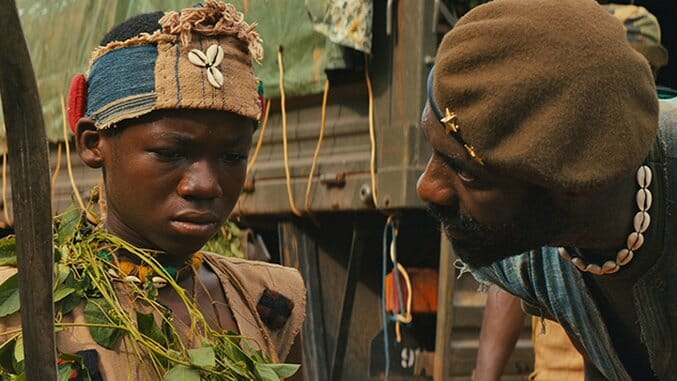Beasts of No Nation

A harrowing descent into a modern-day heart of darkness, Beasts of No Nation channels Francis Ford Coppola’s Vietnam epic Apocalypse Now for its tale of one child’s recruitment into an African rebel battalion. Adapting Uzodinma Iweala’s novel with fearsome intimacy, writer/director Cary Fukunaga depicts his unidentified African setting as a mixture of lushly green forests, bullet-shattered villages and mist-enshrouded horizons—the last of which is due, at least in part, to the fires that rage throughout the countryside. Those conflagrations are the result of a conflict between government and revolutionary forces, the specifics of which the film, like its precise locale, leaves more or less vague. Fukunaga’s film is thus mired in a hazy, nightmarish fugue of violence and degradation, the director presenting a landscape of hellish depravity and amorality through the eyes of one young boy unwittingly swept up in his nation’s insanity.
Beasts of No Nation opens with snapshots of adolescent Agu (newcomer Abraham Attah) going about his day-to-day in a town seemingly shielded by U.N forces from the civil war raging outside its borders. As it does during later sequences of chaos and madness, Fukunaga’s camera sticks closely to Agu in these early passages. We watch the kid trying to sell a hollowed-out television to skeptical soldiers, goofing around with his horny older brother (Francis Weddey), and spying on his mother (Ama K. Abebrese) and local-leader father (Kobina Amissah-Sam) as they debate how to respond to the bloodshed nearing their doorstep. Using proximity to his characters to generate immediate empathy, the director casts Agu inside these vignettes as an innocent learning to confront the adult world through a mixture of good-natured mischievousness and sly attentiveness.
-

-

-

-

-

-

-

-

-

-

-

-

-

-

-

-

-

-

-

-

-

-

-

-

-

-

-

-

-

-

-

-

-

-

-

-

-

-

-

-








































